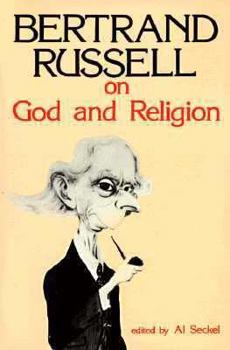Bertrand Russell on God and Religion
Select Format
Select Condition 
Book Overview
I think all the great religions of the world - Buddhism, Hinduism, Christianity, Islam, and Communism - both untrue and harmful. It is evident as a matter of logic that, since they disagree, not more than one of them can be true.Bertrand Russell wrote these words in his famous essay, Why I Am Not A Christian. In Bertrand Russell on God and Religion, Al Seckel presents in one volume the severe scrutiny Russell brought to bear on organized religion in his best essays. Bertrand Russell on God and Religion is an exhaustive compilation of Russell's best essays on religion, free thought, and rationalism. Al Seckel has rescued many of the writings from obscure pamphlets, chapters buried in books, and from out-of-print periodicals. From the outset of his career, Russell struggled to uproot and expose the remnants of Puritanism's emphasis upon guilt, sin, and moral condemnation. In Why I Am Not A Christian, he wrote, Religion is based . . . primarily and mainly upon fear . . . fear of the mysterious, fear of defeat, fear of death. Fear is the parent of cruelty, and therefore, it is no wonder if cruelty and religion have gone hand in hand. It is in this vein that Russell approached religion. The essays in this book are representative of the full range of his thinking on the subject. Some of the essays included are, My Religious Reminiscences, A Debate On The Existence of God, What Is An Agnostic? and Are the World's Troubles Due to Decay in Faith? Bertrand Russell was the recipient of countless awards for excellence during his long lifetime (1872-1970), including the Nobel Prize for literature, which he won in 1950. The range of his critical inquiry is without parallel in contemporary Western culture.
Format:Paperback
Language:English
ISBN:0879753234
ISBN13:9780879753238
Release Date:June 1986
Publisher:Prometheus Books
Length:350 Pages
Weight:1.11 lbs.
Dimensions:1.1" x 6.1" x 9.0"
Customer Reviews
3 ratings
A Theologian's Nightmare
Published by Thriftbooks.com User , 19 years ago
+++++ This book consists of twenty-one essays written by Bertrand Russell (1872 to 1970) between 1912 and 1961. They were compiled and edited by Al Seckel, a member of the Bertrand Russell Society and one who has lectured extensively on Russell's life and work. According to Seckel, "the purpose of this collection is to bring together in one...volume some of Russell's most delightful thought-provoking essays on [organized] religion." Some topics discussed are agnosticism, atheism, rationalism, churches, God, the soul, science, free thought, sin, and faith. He examines these and other topics with "rational skepticism" which is "withholding judgment where the evidence is not sufficient, or, even more so, when there is contrary evidence." This collection of essays definitely captures the scope and depth of Russell's thinking on religion. His logic and reasoning are impeccable. I now understand why he was called "the world's most famous atheist." The book is divided into five parts. Here are the titles of my favorite essays taken from each part: I. (6 essays) (1) Why I am not a Christian. (2) The faith of a rationalist. (No supernatural reasons are needed to make humans kind.) II. (5 essays) (1) A debate on the existence of God. (Between Russell and a Father of the church.) III. (2 essays) (1) Science and religion. IV. (6 essays) (1) An outline of intellectual rubbish. (2) The value of free thought. (How to become a truth-seeker and break the chains of mental slavery.) (3) Ideas that have harmed mankind (and womankind). (4) Ideas that have helped mankind (and womankind). V. (2 essays) (1) The theologian's nightmare. Before the first essay begins, there is a brief biography of Bertrand Russell (later Lord Russell) by Seckel. It is very thorough as evidenced by the more than 55 footnotes at its end. Finally, the only problem I had with this book is with regard to referencing. All essays are not referenced or inadequately referenced. I know that Russell in his other works extensively referenced. Thus, I'm not sure if Seckel edited out references to save space and assumed that the reader would believe everything Russell said due to his reputation. On a subject like this, I think references should have been kept in. Also, there is a bibliography at the end of the book. But it is really just a list of books written by Russell. In conclusion, this is a fascinating collection of essays by one of most prolific and brilliant thinkers and writers of the twentieth century. Now I understand why Russell won the 1950 Nobel Prize in literature!! **** 1/2 (essay collection published 1986; acknowledgements; biography of Bertrand Russell; 5 parts or 21 chapters; main narrative 300 pages; "bibliography;" name index; subject index) +++++
Everything I expected
Published by Thriftbooks.com User , 21 years ago
After reading 'Why I am not a christian', I was excited to find that there existed an even larger collection of Mr. Russells essays. Some of the essays in this book are already in 'Why I am not a christian', including that particular essay. The others I had not read before were informative, well-structured, and balanced. He was truly a man ahead of his time.
Religion understood as a terrible bar of truth
Published by Thriftbooks.com User , 25 years ago
It appears in these selections that Russell was a very complex person who thought a great deal about religion. His views are not always consistent and they are pervaded by emotion. His general tendency is against religion. He especially hates Christianity as it has been practiced throughout history and the idea of Christian faith. He takes faith to be a set of related beliefs, on substantial issues, for which one has no good reasons. This selection is light reading, but it is too unfair to be used as an introduction to the philosophy of religion. Of course, this is one of the features of Russell's thought on religion that makes him psychologically interesting.






